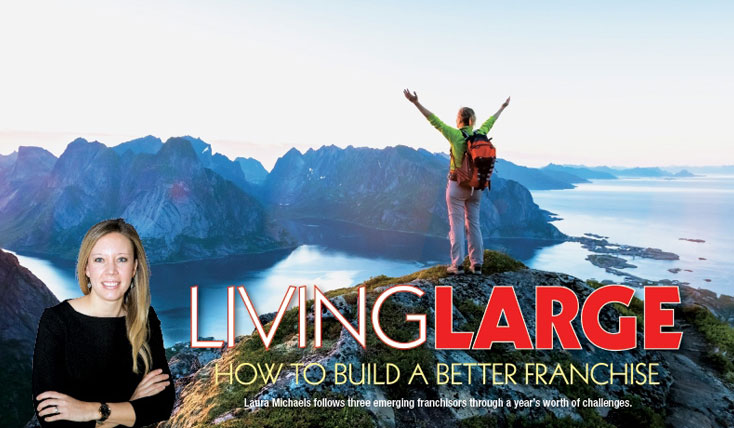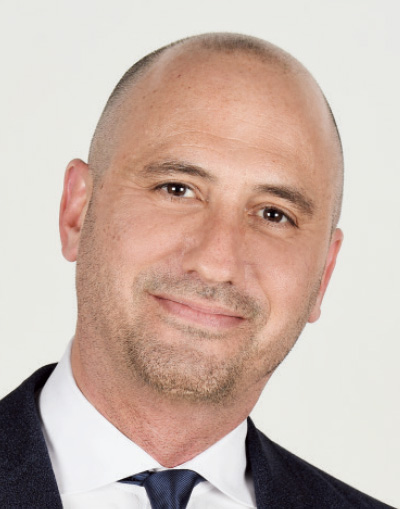
In Living Large, three new brands aim to beat odds in hopeful start
Young franchise concepts are all the rage, garnering attention and drawing crowds to workshops and events aimed at those who believe they’re the next big thing. These emerging brands, as they’ve come to be known, often envision hundreds of locations across the country as they sign major development deals and watch consumers flock to their doors.
The reality is often much harsher, however, as a recent study by market research company Franchise Grade shows. Many emerging franchises (defined as 100 franchised outlets or fewer) struggle to grow beyond 25 to 50 locations, with 52 percent of U.S. franchises that started 10 years ago at 50 franchise units or less. Of the emerging brands studied, another 30 percent that started four years ago have one or zero locations, the study said.
But then there’s the 20 percent that reached or surpassed 100-plus locations in six to 10 years. These are the success stories and the ones that inspire emerging franchisors and franchisees alike to stick with it
The three brands we’re following this year for Living Large want to eventually join that 20 percent but have, it seems, more realistic expectations of how to get there, with plans to open anywhere from three to 10 franchise locations in 2018.
“Tenders ‘all we do’”

Andy Howard, Huey Magoo’s
Andy Howard scoured the country, “tasting every chicken tender I could put in my mouth,” before landing on Huey Magoo’s, the then-four-unit Orlando, Florida, restaurant company he bought from founders Matt Armstrong and Thad Hudgens in spring 2016.
It was the “incredibly successful” introduction of chicken tenders to the Wingstop menu that had Howard hunting for a tender-focused concept of his own. The former executive vice president of Wingstop spent nearly 10 years at the chicken wing chain, helping it grow from 80 stores to more than 600 (today that number is 1,000-plus).
“I knew I was either going to start my own or buy an emerging brand,” says Howard, now a CEO who’s made a career in chicken, working at Ranch One and Kenny Rogers Roasters before Wingstop. He says Huey Magoo’s is a winner first and foremost for its quality, and after a few tweaks to the model it’s now in full franchising mode.
Those tweaks included some menu adjustments, both in pricing and offering. “We took a little bit of a price increase,” says Howard, which was meant to position Huey Magoo’s as a premium brand because “tenders are all we do.” Four sauce coatings were introduced, as were family packs and “Tenders for 2,” changes Howard says “help raise the average check and create some different options for consumers.”
Former Wingstop VP of training Mike Sutter came on board as a co-owner and executive VP of operations, putting together a labor model Howard says “gives great hospitality but doesn’t waste resources.” (Fellow former Wingstop execs Wes Jablonski, Bill Knight and Tom Roberts also have a stake in the company.)
Huey Magoo’s is rolling out a sleeker, more industrial design with natural woods and a branding wall dominated by images of smiling customers. The new design also features three service lines to make room for online and delivery orders as Huey Magoo’s runs tests with UberEats and DoorDash.
“We made all of these changes with franchising in mind,” says Howard.
“I’m not going to sit here and say we’re going to get to 1,000 locations,” he continues. “We’re going to get to 10 first, then 20 and go from there.”
Huey Magoo’s is up to seven locations, six of them franchised, all in the Orlando area. Its founders retain an ownership interest in the company and are franchisees of two locations. The goal for 2018 is to open five franchise restaurants.

“For anyone that franchises a DMK Burger Bar, they’re getting us.” — David Morton, DMK Burger Bar
Premium burger positioning
Back when David Morton and Michael Kornick first launched their craft burger concept DMK Burger Bar in Chicago’s Lakeview neighborhood in 2008, Morton says his phone was ringing off the hook with offers from people who wanted to help the brand expand. It’s not hard to imagine, considering restaurants are in Morton’s blood as the son of legendary restaurateur Arnie Morton, and Kornick is a five-time James Beard Award nominee for Best Chef, Midwest.
“At the risk of sounding trite, we’ve been inundated with franchise inquiries since we opened our doors,” says Morton, but it wasn’t until he and Kornick began talks with franchise veteran David Grossman two years ago that they began seriously considering the idea of nationwide expansion.
Now joined by Grossman, who helped scale Freshii and Subway, DMK Burger Bar rolled out its franchising program in October and already signed its first franchisee, Carolyn Michael, who will open three locations in the Chicagoland area.
With eight other concepts under its DMK Restaurants umbrella, Morton says they already have a strong operations framework, with construction, real estate and design expertise as well. And with a focus on data as the burger bar has grown to four company locations, Morton says they’ve built a strong menu that’s primed for expansion to other markets.
“We almost accidentally created a perfect platform for franchising,” he says.
DMK Burger Bar also has flexible formats it can roll out in different areas, from its full-service Lakeview location with craft cocktails to counter service at Soldier Field. What’s not flexible is the brand’s premium positioning as it touts 100 percent grass-fed beef, aged cheeses and prices to match, with burgers in the $10 to $15 range.
“We aspire to have the same quality and attributes as a Morton’s Steakhouse but in the burger segment, and for that there’s much less competition,” says Morton. “It’s a burger for people that really treasure quality.”
While he sees “an unlimited amount of white space” out there for the brand, Morton says expansion will be “solely dictated by the right partnership opportunities,” and the founders’ desire to be heavily involved in the process. “We’re incredibly, actively involved in every aspect of our business. This is not an armchair executive philosophy,” stresses Morton. “For anyone that franchises a DMK Burger Bar, they’re getting us.”
“On the front edge of technology”

“Adding device sales was probably strategically the biggest thing we did since taking over the brand.” — Levi Dinkla, Digital Doc
In the ever-changing technology world, companies competing for their share of the device repair market need to keep up with the latest digital gadgets. At Digital Doc, that’s meant the creation of a robust training program, something President Levi Dinkla says gives the brand a leg up, both in serving customers and appealing to potential franchisees.
“Because product lines change so quickly, it’s really important to train and do so in a cost-effective manner,” says Dinkla.
The development of a complete hiring, training and certification program is something Glenview, Illinois-based Highland Ventures undertook when it acquired then 13-unit Digital Doc in 2015. Highland Ventures aims to provide a high level of customer service at all of its brands—it’s the largest franchisee of Marco’s Pizza with 135-plus locations and owns 750-unit Family Video—which makes training especially important as “our vision is to bring that philosophy to the Digital Doc brand,” says Dinkla.
“We’re hiring not just super, super techy people,” he continues, but “customer service people who we can teach to repair the devices.”
Digital Doc now has three company-owned and 35 franchise locations across more than a dozen states, but before targeting growth Dinkla says he and the executive team “took a big step back” for eight months following the acquisition to analyze every aspect of the business. One area they saw opportunity was in sales, and so Dinkla introduced sales of certified, pre-owned devices, including cell phones, tablets and computers.
“Adding device sales was probably strategically the biggest thing we did since taking over the brand,” says Dinkla, and it’s a move that not only gives consumers options but also is another revenue stream for franchisees.
Highland Ventures is well positioned to grow Digital Doc, says Dinkla, because “we already have a marketing department, real estate, HR—the things you really need to grow via franchising.” Dinkla specifically notes Highland Ventures’ extensive real estate holdings through its Legacy Commercial Property business, giving it an advantage as it helps franchisees find locations.
Digtal Doc aims to open 10 franchise locations in 2018, an attainable goal, says Dinkla, as it transitions to a growth model with a heavy focus on signing multi-unit owners.
“Laura Michaels, managing editor, reports the progress of three emerging franchisors through an entire year of unit sales and growing pains. Join the discussion and contribute your brand’s best practices in her LinkedIn group, Franchise Times Insights. Upcoming topics are: attracting capital; accelerating franchise sales; and navigating legal matters. Reach her at lmichaels@franchisetimes.com.”
As mentioned at Franchise Times
